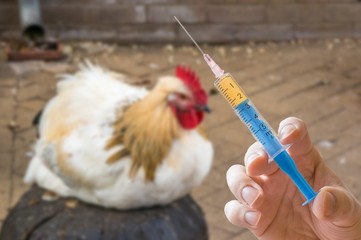
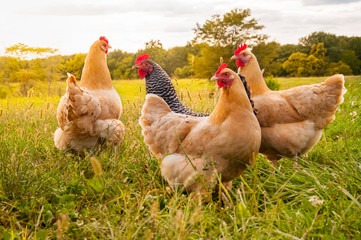
Understanding Chicken Health: Importance and Common Diseases
As backyard chicken keeping continues to grow in popularity, so does the importance of understanding and maintaining chicken health. Whether you’re a seasoned poultry enthusiast or new to raising chickens, knowing how to recognize signs of illness is crucial. Preventing common diseases is also essential for ensuring the well-being of your feathered friends. Here’s a comprehensive introduction to the significance of chicken health. It also provides an overview of some prevalent diseases to watch out for.
Why Understanding Chicken Health Matters
Keeping chickens healthy goes beyond just ensuring a steady supply of fresh eggs. Here are key reasons why understanding chicken health is essential:
- Animal Welfare: Chickens are sentient beings deserving of care and attention to their health and well-being.
- Egg Production: Healthy chickens are more likely to lay consistently and produce higher-quality eggs.
- Cost Efficiency: Preventing diseases through proper care can save you money on veterinary bills and replacement birds.
- Family Health: Chickens in backyard settings can come into close contact with humans. This makes disease prevention important for both chicken and human health.
Common Chicken Diseases
Knowing the signs and symptoms of common chicken diseases is important. It can help you take early action. This prevents outbreaks and protects your flock. Here are a few prevalent diseases to be aware of:
- Avian Influenza (Bird Flu): A viral infection that can cause respiratory distress. It also leads to decreased egg production. In severe cases, it results in high mortality rates.
- Coccidiosis: A parasitic disease affecting the intestinal tract, leading to diarrhea, weight loss, and sometimes death, especially in young chickens.
- Marek’s Disease: A viral disease affecting the nervous system, causing paralysis, tumors, and death, primarily affecting young chickens.
- Fowl Pox: A viral disease characterized by lesions on the skin and mucous membranes. It leads to reduced egg production and sometimes respiratory distress.
- Infectious Bronchitis: A viral respiratory disease causing coughing, sneezing, and decreased egg production, often mistaken for other respiratory infections.
Preventative Measures
Maintaining good chicken health starts with prevention. Here are some essential tips to keep your flock healthy:
- Clean Environment: Regularly clean and disinfect the coop and surrounding areas to reduce the risk of disease transmission.
- Biosecurity: Practice strict biosecurity measures, including limiting visitor access and quarantining new birds before introducing them to the flock.
- Nutrition: Provide a balanced diet with access to clean water and appropriate feed to support immune function.
- Observation: Monitor your chickens daily for any signs of illness, such as changes in behavior, appearance, or egg production.
- Vaccination: Depending on your region and flock size, consider vaccinating against common diseases like Marek’s disease and infectious bronchitis.

Preventive Chicken Health Care: Ensuring a Healthy Flock
Maintaining the health of your backyard chickens requires proactive measures to prevent diseases and ensure their well-being. By implementing preventive chicken health care strategies, you can minimize the risk of illnesses and promote a thriving flock. Here’s a guide to essential practices including vaccination schedules, biosecurity measures, and regular health checks.
Vaccination Schedules for Chicken Health
Vaccinations are crucial to protect chickens from common and potentially devastating diseases. The specific vaccines needed may vary based on your location, flock size, and local disease prevalence. Here are some common vaccinations and their recommended schedules:
- Marek’s Disease Vaccine:
- Timing: Administered to chicks within the first day of hatch. Alternatively, it can be given through the drinking water at 1 day old. It should then be boosted at 3 weeks and 16 weeks old.
- Protection: Protects against Marek’s disease, which can cause tumors, paralysis, and mortality.
- Infectious Bronchitis Vaccine:
- Timing: Given to chicks as early as 1 day old, with a booster at 3-4 weeks old.
- Protection: Guards against a respiratory disease that affects egg production and overall health.
- Newcastle Disease Vaccine:
- Timing: Typically administered at 1 day old, with a booster at 4-6 weeks old.
- Protection: Prevents Newcastle disease, which causes respiratory and nervous system issues.
Check with your local agricultural extension office or veterinarian to determine the specific vaccinations needed for your region and flock.
Biosecurity Measures
Biosecurity measures are essential to prevent the introduction and spread of diseases among your chickens. Here’s how to implement effective biosecurity practices:
- Limit Visitor Access: Restrict access to your coop and run area to essential personnel only. This helps to reduce the risk of introducing diseases.
- Quarantine New Birds: Isolate new chickens for at least 30 days before introducing them to your existing flock. Monitor them for signs of illness during this period.
- Cleanliness: Keep the coop and surrounding areas clean and free of debris. Regularly remove bedding, droppings, and spilled feed.
- Footwear and Clothing: Use dedicated footwear and clothing when interacting with your chickens. Consider disinfecting these items between visits to different areas.
Regular Health Checks
Monitoring your chickens regularly allows you to identify health issues early and take prompt action. Here are key aspects of regular health checks:
- Observation: Observe your chickens daily for changes in behavior, appetite, egg production, and appearance.
- Physical Examination: Handle each chicken to check for signs of injury, parasites, or abnormalities.
- Egg Quality: Monitor egg production and quality, as changes can indicate underlying health issues.
- Record Keeping: Keep a health log to track vaccinations, treatments, and any observed health changes.
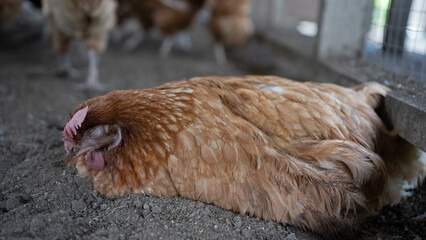
Understanding Common Chicken Diseases: Symptoms, Causes, Treatment, and Prevention
Keeping your backyard chickens healthy involves being aware of common diseases that can affect them. Recognizing the symptoms is essential for maintaining a thriving flock. Understanding the causes is essential for maintaining a thriving flock. Knowing how to treat and prevent these diseases is essential for maintaining a thriving flock. Here’s an overview of three significant chicken diseases: coccidiosis, Marek’s disease, and avian influenza.
1. Coccidiosis
Symptoms:
- Diarrhea (often bloody)
- Loss of appetite
- Weakness and lethargy
- Ruffled feathers
- Weight loss
- Dehydration
Causes: Coccidiosis is caused by several species of the protozoan parasite Eimeria. Chickens become infected by ingesting oocysts (parasite eggs) found in contaminated soil, water, or feed.
Treatment:
- Administering coccidiostats (medications to treat coccidiosis), such as amprolium or sulfadimethoxine, in the water or feed.
- Providing supportive care, such as electrolytes and vitamins, to combat dehydration and weakness.
Prevention:
- Practice good hygiene by regularly cleaning and disinfecting the coop and feeding areas.
- Use coccidiostats as a preventative measure during periods of stress or known outbreaks.
- Maintain dry bedding and provide clean, uncontaminated water and feed.
2. Marek’s Disease
Symptoms:
- Paralysis of legs, wings, or neck
- Tumors on skin, organs, or nerves
- Weight loss despite normal appetite
- Decreased egg production in hens
- Behavioral changes, such as isolation or depression
Causes: Marek’s disease is caused by the Marek’s disease virus (MDV), a highly contagious herpesvirus. Chickens become infected through inhalation or ingestion of viral particles shed by infected birds.
Treatment:
- There is no cure for Marek’s disease once chickens are infected.
- Vaccination is the most effective preventive measure, typically administered to chicks shortly after hatching and boosted at specific intervals.
Prevention:
- Vaccinate chicks against Marek’s disease to reduce susceptibility.
- Maintain strict biosecurity measures to prevent the introduction and spread of the virus.
- Separate new birds from the existing flock and quarantine them for at least 30 days.
3. Avian Influenza (Bird Flu)
Symptoms:
- Sudden death (highly pathogenic strains)
- Respiratory signs such as coughing, sneezing, and nasal discharge
- Swelling and discoloration of combs and wattles
- Decreased egg production and quality
- Diarrhea (less common)
Causes: Avian influenza is caused by influenza A viruses that primarily affect birds. Some strains are highly pathogenic, causing severe illness and high mortality rates in poultry.
Treatment:
- Treatment options are limited, and supportive care may include antibiotics to prevent secondary bacterial infections.
- Infected birds are often culled to prevent the spread of the virus.
Prevention:
- Practice strict biosecurity measures, including limiting access to your flock and disinfecting equipment and clothing.
- Monitor for signs of avian influenza and report any suspected cases to veterinary authorities.
- Vaccination may be available for specific strains in regions with prevalent outbreaks.
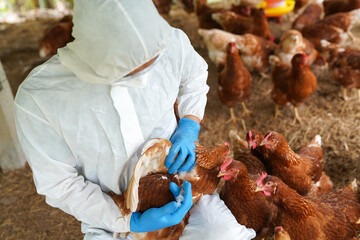
Understanding Parasitic Chicken Infections: Identification and Treatment for Chicken Health
Internal Parasites
Types:
- Roundworms (Ascarids):
- Symptoms: Weight loss, poor growth, diarrhea, and occasionally visible in feces.
- Treatment: Deworming medications like fenbendazole or ivermectin are administered orally or in feed.
- Cecal Worms:
- Symptoms: Similar to roundworms; often found in the ceca (part of the digestive tract).
- Treatment: Deworming medications are effective against cecal worms, such as piperazine or levamisole.
- Gapeworms:
- Symptoms: Gasping for air, coughing, and stretching necks.
- Treatment: Deworming with specific medications like fenbendazole or levamisole.
External Parasites
Types:
- Chicken Mites and Lice:
- Symptoms: Feather loss, irritation, visible insects on the bird or in the coop.
- Treatment: Dusting with poultry dust containing permethrin or spraying with pyrethrin-based products. Clean and treat the coop thoroughly.
- Northern Fowl Mites:
- Symptoms: Similar to chicken mites, can cause anemia and decrease egg production.
- Treatment: Dusting or spraying birds with appropriate insecticides, and cleaning and treating the coop.
Prevention and Control Measures for Chicken Health
- Regular Inspection: Check chickens regularly for signs of parasites, including under wings, around vents, and in feces.
- Cleanliness: Keep the coop clean and dry, regularly removing bedding and feces to reduce parasite habitats.
- Quarantine and Treatment: Quarantine new birds before introducing them to the flock. Treat them for parasites to prevent spreading infections.
- Rotation of Grazing Areas: Allow pasture areas to rest and recover periodically to break parasite life cycles.
- Consultation: Seek advice from a veterinarian for specific parasite control programs and medications suitable for your flock.
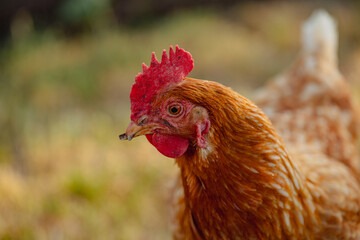
Understanding Nutritional Chicken Deficiencies: Recognition and Solutions
Ensuring proper nutrition is essential for maintaining the health and productivity of your backyard chickens. Nutritional deficiencies can lead to various health issues and reduced egg production. Recognizing the signs of common deficiencies and addressing them promptly is key to supporting a healthy flock. Here’s a guide to identifying and addressing nutritional deficiencies in chickens.
Common Nutritional Deficiencies
1. Calcium Deficiency:
- Signs: Soft or thin-shelled eggs, eggshell abnormalities, weak or soft bones.
- Causes: Inadequate calcium intake, especially during periods of high egg production.
- Solution: Provide a calcium supplement such as oyster shells or crushed eggshells in a separate feeder.
2. Protein Deficiency:
- Signs: Poor growth in chicks, reduced egg production, feather loss, weak immune system.
- Causes: Insufficient protein content in feed, inadequate dietary balance.
- Solution: Ensure chickens have access to a balanced feed containing sufficient protein (usually around 16-18% for laying hens).
3. Vitamin Deficiencies (e.g., Vitamin A, D, E):
- Signs: Poor feather quality, decreased egg production, vision problems, immune system weakness.
- Causes: Lack of access to fresh greens (for Vitamin A), sunlight (for Vitamin D synthesis), or poor-quality feed.
- Solution: Provide a varied diet including greens, grains, and fortified feed. Consider supplements if deficiencies are suspected.
4. Vitamin B7 Deficiency (Biotin)
- Signs: beak and leg deformities, as well as sticky eyelids
- Causes: Poor biotin availability in chicken feed, genetic defects, stress
- Solution: Provide high-quality chicken layer feed to the flock for healthier hatching chicks, or provide biotin supplement in water. Reduce stress. Consider purchasing new laying hens or a rooster for better genetics.
5. Phosphorus Deficiency:
- Signs: Reduced growth rate, poor bone development, decreased egg production.
- Causes: Imbalance in calcium-to-phosphorus ratio in feed, inadequate phosphorus intake.
- Solution: Ensure feed contains a balanced ratio of calcium to phosphorus (usually around 2:1).
Addressing Nutritional Deficiencies
- Quality Feed: Provide a balanced commercial feed appropriate for the age and purpose of your chickens (e.g., starter, grower, layer feed).
- Supplements: Offer supplements as needed. Provide calcium sources like oyster shell. Give vitamins, especially during molting or stress. Supply minerals such as phosphorus.
- Access to Greens: Allow chickens access to fresh greens, which provide essential vitamins and minerals.
- Hydration: Ensure chickens have access to clean, fresh water at all times, as dehydration can exacerbate nutritional deficiencies.
Prevention Tips for Chicken Health
- Regular Assessment: Monitor your chickens regularly for signs of nutritional deficiencies, especially during periods of stress or high production.
- Consultation: Seek advice from a veterinarian or poultry nutritionist. They can provide tailored advice on feed and supplements based on your flock’s specific needs.
- Education: Educate yourself on proper chicken nutrition and the specific requirements of different breeds and ages.

Emergency Chicken Care: First Aid Tips and Knowing When to Contact a Veterinarian
When raising backyard chickens, emergencies can arise unexpectedly, requiring prompt action to ensure the health and well-being of your flock. Be prepared with basic first aid knowledge. Also, know when to seek veterinary assistance. These can make a significant difference in the outcome. Here’s a guide to emergency chicken care, including essential first-aid tips and when to contact a veterinarian.
Common Emergencies and First Aid Tips
1. Wounds and Injuries:
- First Aid: Clean the wound with saline solution or diluted iodine. Apply an antibacterial ointment and cover with a clean bandage or gauze.
- When to Contact a Veterinarian: Seek veterinary care if the wound is severe, deep, or bleeding heavily, or if there are signs of infection (e.g., swelling, pus).
2. Respiratory Distress:
- First Aid: Provide a quiet and warm environment. Ensure good ventilation. Monitor breathing and observe for nasal discharge or coughing.
- When to Contact a Veterinarian: Immediate veterinary attention is needed if the chicken is gasping for breath. Seek help if it has a blue comb or wattles. Also, contact a vet if the chicken shows signs of severe respiratory distress.
3. Egg Binding (Dystocia):
- First Aid: Provide a warm bath to relax the muscles. Lubricate the vent with mineral oil or vegetable oil. Gently massage the abdomen to encourage egg passage.
- When to Contact a Veterinarian: If the egg cannot be passed after gentle efforts. Contact a veterinarian if the hen appears weak. Contact a veterinarian if the hen is lethargic or in distress.
4. Poisoning or Toxicity:
- First Aid: Remove the source of poisoning if safe to do so. Offer activated charcoal (if available) to absorb toxins. Provide plenty of fresh water.
- When to Contact a Veterinarian: Seek immediate veterinary care if poisoning is suspected. Be prepared to provide details on what the chicken may have ingested.
5. Heat Stress or Hypothermia:
- First Aid: Move the chicken to a cooler or warmer environment as appropriate. Offer water and monitor for signs of distress or lethargy.
- When to Contact a Veterinarian: If the chicken shows severe signs of heatstroke. Symptoms include panting excessively, drooling, and weakness. Contact a veterinarian if the chicken shows severe signs of hypothermia. Symptoms include shivering and lethargy.
When to Contact a Veterinarian for Chicken Health
- Severe Injuries: Deep wounds, broken bones, or excessive bleeding.
- Sudden Illness: Rapid onset of symptoms like severe diarrhea, paralysis, or collapse.
- Unresponsive Treatment: If initial first aid measures do not improve the chicken’s condition within a reasonable timeframe.
- Difficulty Breathing: Gasping for air, wheezing, or signs of respiratory distress.
- Egg-related Issues: Persistent egg binding or reproductive problems.
In Summary
Understanding chicken health and common diseases is essential for successful backyard chicken keeping. Learn preventative measures. Recognize early signs of illness. By doing so, you can ensure a healthy flock. This will enhance your enjoyment of raising chickens. Prioritizing chicken health involves vaccination schedules, biosecurity measures, regular health checks, and proper hygiene practices. Being informed and proactive helps in preventing diseases like coccidiosis, Marek’s disease, and avian influenza. Monitoring for parasitic infections and addressing nutritional deficiencies are also critical. Preparedness for emergencies with basic first aid and knowing when to seek veterinary care is important. Staying vigilant and proactive leads to a thriving and rewarding chicken-keeping experience.


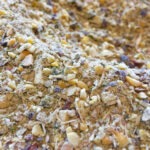 Previous Post
Previous Post Next Post
Next Post